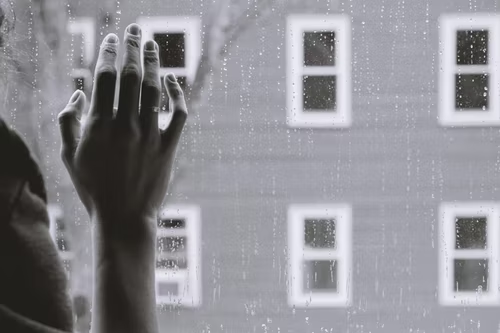8 Things You Should Never Say To Someone With Anxiety
Anxiety comes in a number of forms and varies in severity. Whether you suffer from anxiety or know someone who does, you likely know how difficult it can be to provide support. While there are many things you can say which may help relieve anxiety, there are also a few phrases that most certainly should never be used. Let's look at 8 things you should never say to someone with anxiety.
1. “You're being too sensitive.”
It's true that anxiety can make people feel sensitive. But that doesn't mean they are too sensitive—it means their anxiety is causing them to be hypersensitive.
This phrase implies that there is a “normal” way to feel and think about things, and if someone is experiencing an emotion or thought that differs from the norm, then they are overreacting or “over-thinking” things. But in reality, there is no normal. There is no one way for everyone to think or feel about something. There are just as many ways for people to experience and react to situations as there are people in the world!
So next time someone tells you this during panic attacks, take it as an opportunity to educate them on what it means when someone has anxiety and how it affects them.
2. “Just calm down!”
When you tell someone with anxiety to “calm down,” it implies that their feelings are irrational and don't make sense. But for someone with an anxiety disorder, those feelings are very real—they're caused by a chemical imbalance in the brain, which is not something that can be easily controlled by willpower alone. It takes time and treatment for the chemicals in your brain to return to normal levels again (if ever), so until then, it's important for people with anxiety disorders to get support from others around them who understand what they're going through. People with anxiety often avoid talking about how they feel because they're afraid of being judged or misunderstood by others. However, when we say this phrase, we reinforce that fear by making them feel even more isolated than they already do!
3. “You have nothing to worry about.”
When someone with anxiety tells you that they're worried, it's kind of a big deal. It means they're really trying to trust you and share something vulnerable with you. That's why it can be so hurtful when you respond with “you have nothing to worry about.”
It's true that sometimes it feels like there's nothing to worry about. Sometimes, even if you're in the middle of a crisis, it can still feel like everything is going fine on the outside. But this is different with people with anxiety.
Saying these words sends them into a tailspin of self-doubt and self-deprecation because they feel like they've failed at being able to handle a situation on their own.
So, it's important to remember that everyone experiences anxiety differently. Some people may feel anxious all of the time, while others might experience it only in specific situations. Either way, it's important to understand what someone with anxiety is going through and how you can best support them.
4. “You're just making it worse for yourself by having those thoughts.”
You may not realize it, but you're actually making the situation worse for your loved one or to someone when you say things like this. This type of statement can make it seem like their feelings are irrational, which can make them feel like they aren't being taken seriously or listened to.
Additionally, it implies that they shouldn't be experiencing those emotions and that they should just “tough through” them. This is not only unhelpful but also harmful to someone who is already struggling with their mental health.
Instead of saying this, try asking questions about what triggered the anxiety in the first place so you can find out how best to help them cope with it without causing more harm than good!
5. “You're overreacting again”
The main reason why people with anxiety are so sensitive to what others say is because they have a heightened sense of reality. They can feel and see things that you cannot. That being said, it is important to understand that other people may not be able to see or grasp the magnitude of what they are experiencing.
When you tell an anxious person that they are overreacting, it may seem like an attempt to make them feel better. But in reality, this statement is extremely damaging because it makes them question their own reality and what they are feeling. It's important for friends and family members to remember that when someone says something like this, it might be coming from a place of ignorance or misunderstanding.
However, it's also important for people with anxiety not to take these statements personally. Instead, they should try their best not to internalize them at all costs!
6. “You shouldn't be anxious.”
When you say these words, it makes them feel like they're doing something wrong. It suggests that their feelings are wrong, and that they should just ignore them.
Worst, it gives the impression that you think they're overreacting or acting irrational. If you want to help someone with anxiety, it's important to remember that they aren't just being silly or dramatic—their brain really is reacting differently than yours would in similar situations. And because this is an automatic process, they can't help it! When you tell them not to feel something, it implies that there's something wrong with them for feeling it in the first place.
As a person who is not going through anxiety, you have to keep in mind that sometimes people with anxiety need reassurance from others about how normal their symptoms are—but telling them not to worry about it is NOT the way to do this! Instead, try saying something like “I know this feels scary right now,” or “I'm sorry you're going through this.”
7. “Let me know if there's anything I can do for you.” (and then do nothing)
“It's going to be ok.” is a phrase that many people use when they're trying to comfort someone who is experiencing anxiety. But it's not always the best thing to say, and in some cases it can actually make things worse.
The reason is that it's vague and noncommittal. When you tell someone “it's going to be ok,” you aren't really saying anything about how you're going to make it better, or what you're going to do about the situation. You're just telling them that “everything will turn out fine.” This can make people feel even more helpless, because now they don't know how to help themselves or what steps they should take next.
Aside from that, saying these words doesn't acknowledge the situation at hand. When someone is having an anxiety attack or panic attack, they need reassurance that things will calm down and get better—not just a vague promise of some future positive outcome without any explanation of what that might entail.
That being said, try sitting down beside them for a moment and wait for them to calm down. After that offer some practical ways in order for them to overcome their panic attacks or when they are feeling anxious.
8. “You're just crazy.”
It's a phrase that comes out of your mouth before you even realize it, and it's one of the most dangerous things you can say to someone with anxiety. This is partly because people with anxiety are already aware that their symptoms aren't normal, but also because this phrase is often used as a weapon against them.
When someone tells someone else they're “crazy,” it's usually because they don't understand what they're going through—and that's understandable! It's hard to imagine what it feels like to have such intense emotions and physical sensations that sometimes feel out of control. But when you call someone “crazy,” you're implying that their feelings and experiences are overblown or exaggerated, which is not only untrue but also incredibly hurtful.
So instead ofn Try asking questions instead of making judgments. You might find out something new about your friend or family member's experience with anxiety or depression and gain some insight into what it means for them.
Recognize the signs and symptoms of anxiety in your loved ones, and if you feel confident in your research, be sure to share them. It's important that people with anxiety find support from those around them—people who are able to recognize their triggers, their habits, and their needs. And above all else, do not make assumptions. Anxiety disorders can consume the lives of the sufferer and their family. Encouraging people with anxiety to open up about it, will not only help them cope better with their condition–but it will also help you better understand and support them.
For more helpful and informative insights, visit here.





